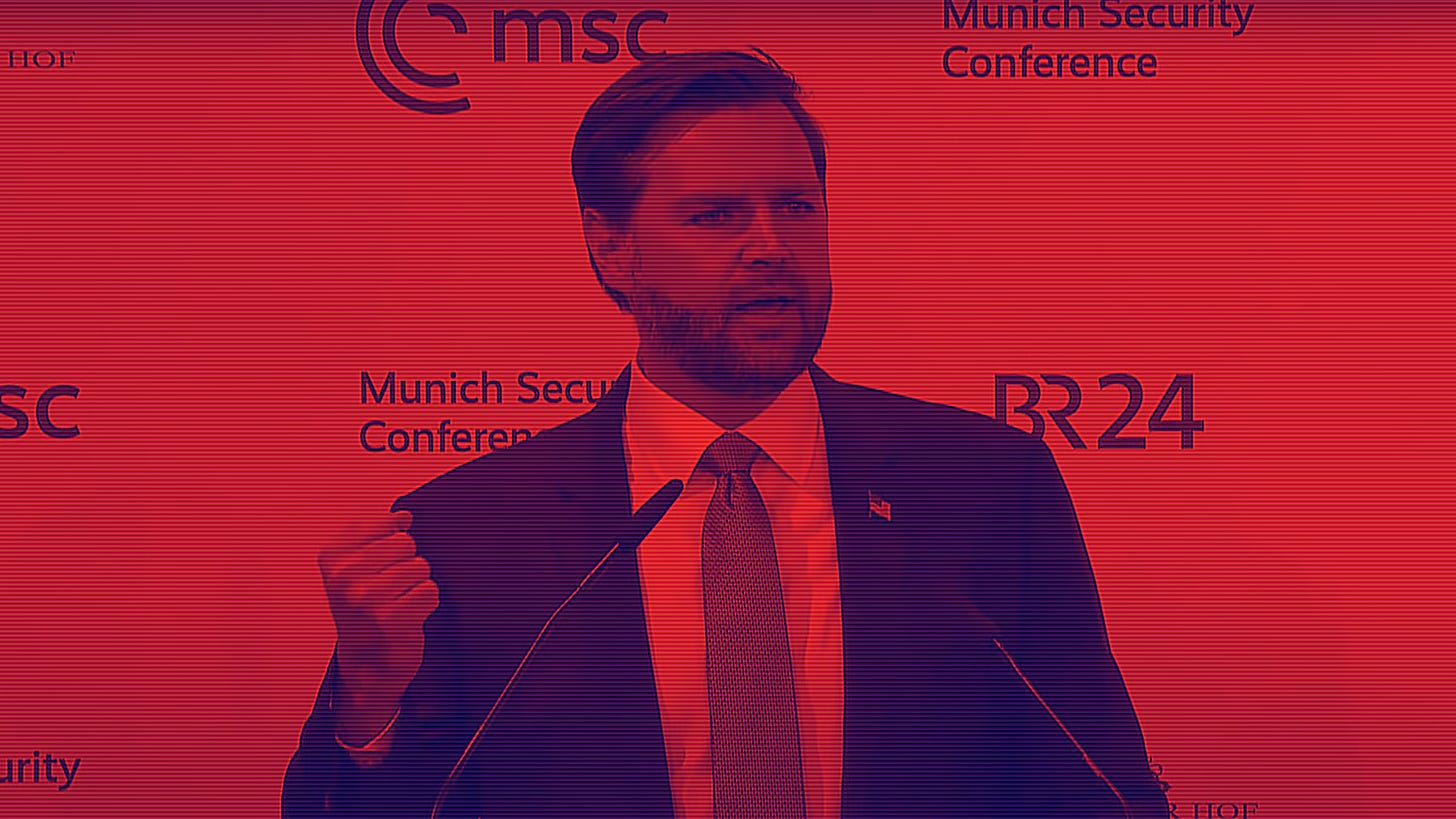JD Vance champions tech imperialism in Europe
The European Union needs to defend its sovereignty and end its dependence on US tech monopolies

For a period after the election, it felt like vice president JD Vance had been sidelined. Elon Musk was constantly at president Donald Trump’s side and seemed to be driving the agenda, while Vance didn’t have nearly the same profile. Some even joked that Musk looked like the real vice president — before he appeared to supplant the president himself. Last week, Vance made it clear he has not been exiled.
In a set of speeches in Europe, Vance showed just how dedicated he is to the MAGA movement, putting his central role in bringing together the agendas of the more traditional right-wing extremists and the tech billionaires on full display. Delivered at the AI Action Summit in Paris and the Munich Security Conference, Vance’s remarks were a broadside against European countries. After seemingly hoping Trump’s ire wouldn’t come for them, many on the continent have woken up to the reality that their relationship with their closest ally may never be the same.
Much of the coverage of the aftermath of the vice president’s speeches has focused on European defense and military spending, particularly as they came at the same time as the Trump administration resumed contact with Russia and put Ukraine out in the cold. But Vance’s words contained much deeper and more troubling messages. Not only does the Trump administration intend to push its far-right agenda abroad, but after ensuring its tech companies dominate international markets, it will not stand for efforts to regulate or displace them.
Going after European values
The audiences in Paris and Munich were stunned at how aggressive Vance — and by extension the new Trump administration — was toward Europe. In Paris, the shock and disdain could be seen on the faces of attendees, while his statements in Munich prompted a rebuke by the German president, among other officials, and caused the conference’s chairman to break down in tears during his closing address. And for good reason.
In Munich, Vance came out swinging. He declared that Europe’s true enemy was not an outside force like Russia, but rather came from within and took the form of a retreat from values the continent once held dear. Specifically, he focused on freedom of speech, saying that European countries had turned away from it — refusing to recognize that his right-wing interpretation of the concept, which effectively asserts that any bigot should be able to say what they want without consequences while those he disagrees with should be silenced, is not one shared by everyone.
That distorted view of free speech has become a cudgel for today’s far-right movement, frequently deployed by tech billionaires like Elon Musk as well against people and governments he disagrees with. Vance specifically called out the exclusion of the neo-Nazi Alternative for Germany (AfD) party from the conference and even met with its leader while he was in the country. Germany is in the middle of an election, and Vance’s actions were rightly viewed as foreign interference in their democratic process. Musk has also vigorously supported the party in recent months.
In line with the Trump administration’s agenda, Vance put part of the blame for Europe’s supposed retreat on free speech and its other values down to increased immigration of non-Europeans, particularly the large number of refugees that has Germany accepted — a reflection of his racist nativism. But the Biden administration didn’t get off the hook: he said it was also silencing people, specifically saying it tried to suppress the theory that Covid-19 leaked from a Chinese laboratory — something experts say did not happen, but Vance asserted was the truth.
The troubling consequences of Vance’s statements didn’t end there. While what he said in Munich showed that Europe can no longer rely on the United States — unless it accepts and emulates the Trump administration’s far-right agenda — his speech days earlier in Paris made it clear that Europe faces a hard choice about its technological future too. The European Union has been leading the global charge to regulate tech, but Vance said the United States will not accept such a challenge to Silicon Valley’s power without a fight.
Demanding a subservient Europe
France has been trying to show it’s a player in the AI race that’s been led by the United States and China, and its AI Action Summit was meant to solidify its position. French president Emmanuel Macron touted over €100 billion in investment in AI infrastructure, with the European Union announcing a €200 billion plan of its own, to try to measure up to the $500 billion Stargate initiative unveiled at the White House weeks earlier. But Vance’s speech threw cold water on those aspirations. He was clear that Europe would be given some room of its own if it agreed to a less restrictive regulatory regime, but that the United States was the leader in AI and “our administration plans to keep it that way.”
For Vance, AI is supposedly a great opportunity that will make us “more productive, more prosperous, and more free,” but only under certain conditions. One of those, of course, was that the United States needs to remain the global leader, but they also included pushing back against “excessive regulation,” ensuring AI tools are free from “ideological bias,” and ensuring it benefits workers. While the last point feels more like public relations than any true commitment, the other two are far more important.
Vance’s point about AI bias isn’t referring to the racial and gender biases that have long been observed in AI systems, where women and racial minorities are often subject to worse outcomes when algorithms are given decision-making power. Rather, it’s more in line with his talk about free speech in Europe — that AI tools must reflect his far-right view of the world, and if they don’t, they’ll be declared biased. Vance’s big example of bias was an AI model made by Google last year that generated images of a black George Washington — something beyond the pale for him and his racist supporters. He said that as Alphabet CEO Sundar Pichai sat nearby on the stage.
The vice president also called out the European Union’s General Data Protection Regulation and Digital Markets Act as creating onerous regulatory burdens for tech companies. He declared the Trump administration would create laws that “will keep Big Tech, Little Tech, and all other developers on an even playing field,” and that it “cannot and will not accept” other countries tightening the screws on its tech monopolists. Vance’s use of the term “Little Tech” was telling, showing how the self-serving agenda of venture capitalists Marc Andreessen and Ben Horowitz is influencing not just policy, but rhetoric.
The United States is “open to partner” with other countries, but Vance was adamant it will control the AI technologies of the future. His speech framed the fight as one between the United States and China, where no other country can compete, and where its allies have to accept its dominance. If they attempt to work with China instead, they will simply be “chaining your nation to an authoritarian master that seeks to infiltrate, dig in, and seize your information infrastructure” — yet for many around the world, that will sound like exactly what the United States has already done to them.
Reject American imperialism
In his whirlwind European tour, JD Vance made it abundantly clear: the United States will accept a compliant Europe that allows American tech companies to dominate its markets with few impediments and follows it down the path toward tech fascism, but if European nations value their sovereignty and have any other plans for their future, there will be trouble. Instead of trying to placate a Trump administration that seems determined to subjugate the United States’ traditional allies, Europe needs to aggressively strike back.
There are already calls for European countries to step up their defense spending in response to Vance’s words and Trump’s abandoning of Ukraine, but the technologies that shape how people in Europe and around the world communicate and increasingly live their lives are just as important, if not more so. This isn’t a moment for the European Union to retreat from its efforts to make foreign tech companies abide by its rules and values, but to accelerate those efforts — even if it means angering the Americans and potentially even forcing some of those companies out of its territory.
Trump’s alliance with American tech billionaires shows that Silicon Valley’s global dominance was always about extending and defending US power in the world. Now they’re just being more explicit about the imperial nature of the American tech industry. As the United States lashes out at Europe, Canada, and other parts of the world, it’s time for those countries to make their own alliance to defend their digital sovereignty by committing to strictly enforcing regulations against American tech giants and putting significant resources into developing alternatives — not just to maximize economic returns, but to ensure technology is developed to improve people’s lives rather than make some companies’ share prices soar.
There’s no doubt that the Trump administration is presenting its traditional allies with a set of difficult and painful choices, but there is also opportunity in the United States’ turn to champion its own narrow self interest. It’s not an “AI opportunity,” as Vance frames it, but one for countries to take back the power they’ve ceded these past few decades and to put technological development back on a path that actually delivers concrete returns over stock market bubbles. Governments should be eager to seize that opportunity and end the spread of Silicon Valley’s exploitation and extremism.








Such a disturbing piece. Disturbing for that fact that it needed to be written instead of us having governments that actually make sense. But unfortunately, the liars here in the US are in charge now and think they can do whatever they want, wherever they want.
Things like "the Trump administration would create laws that 'will keep Big Tech, Little Tech, and all other developers on an even playing field,' and that it 'cannot and will not accept' other countries tightening the screws on its tech monopolists" is a perfect example. This administration thinks they can make laws that will govern the whole world instead of just this country. And if you don't like it you are "'chaining your nation to an authoritarian master that seeks to infiltrate, dig in, and seize your information infrastructure' — yet for many around the world, that will sound like exactly what the United States has already done to them". Even more recently, what this administration is doing to its' own citizens through illegal power grabs.
"Europe needs to aggressively strike back" "forcing some of those companies out of its territory", "committing to strictly enforcing regulations against American tech giants and putting significant resources into developing alternatives", and "take back the power". Maybe start by taking over any offices in the EU of the US tech companies. Or forcing US soldiers out of the EU, while keeping all the equipment to continue to defend the continent. If I could be so bold, have conferences with Vance, Musk, and Trump over there and place them under arrest with no hope of escape. As president, we know that Trump has WMD, no need to go looking for them. And with all the power he has given to Muck lately, he probably has them too.
But maybe this is all just my “ideological bias” coming out. Something I'm proud to have. And unlike the bias Vance claims his version of AI wouldn't have, mine actually "benefits workers", instead of his rich, capitalist, fascist, racist, friends.
Yes: I agree with commenter ic. It's good to hear the European perspective, as well. We Americans need all the support we can get.